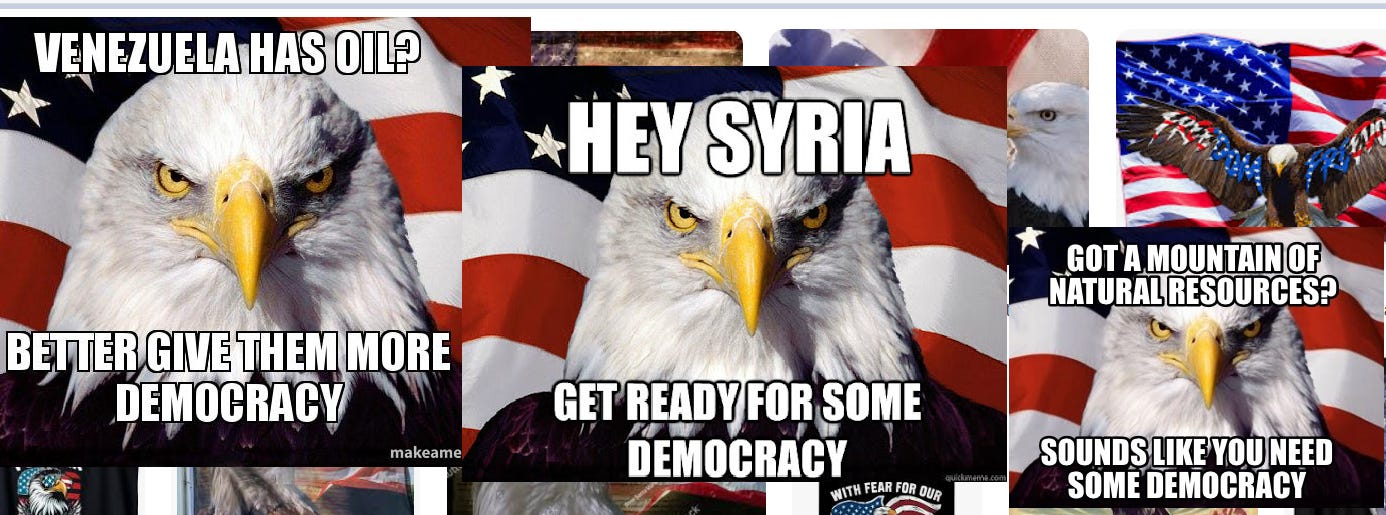Disclaimer: This Silver Academy channel does not favor any religion over any other religion w/ these values underpinning our writings #RSPCT #AllCreatures #AllCultures #AllFaiths #BeKind while speaking out against wars financed by Fiat tyranny. Our opinions are not opinions of our sponsors.
Once Nixon closed the 'gold window ', a term referring to the ability of foreign governments to exchange their US dollars for gold, these four calamities unfurled were unleashed
1/ The US no longer had to honor the gold deposits from countries that purchased our finished goods and oil. This egregious act of fraud, rarely reported in US history, left a deep sense of betrayal. Simply put, European nations deposited their Gold during World War 2; then the US defaulted on all the other nation's deposits (with w/the exception of France, who was able to redeem or repatriate their Gold)
2/ The transition to a fiat currency system void of gold backing had far-reaching effects. The Federal Reserve and US Treasury effectively initiated a continuous money printing process, steadily eroding the US dollar's value. This devaluation, occurring shift after shift, month after month, year after year, was like a slow death by a thousand pay cuts, yielding that US workers were enduring a government-sanctioned reduction in their purchasing power.
3/ It also meant that politicians no longer had to ask the people to approve wars. All accountability to the public vanished. In a healthy, efficient, virtuous, fair or functioning republic, the representatives listen to the will of the people and then vote in a manner that serves the interests of the citizens.
This is what we call 'representative government.' The operative word 'represent' translates to make present what is not present. But in our current system, this representation is a mere illusion, leaving the public without a voice in crucial decisions.
Since we can't fill The US Capitol with 330 million people, the idea is to send representatives who will act in the interest of the workers and villagers.
In the case of every war since World War 2, there is no single case where the voters would approve of any of these US foreign adventures wars.
But under our corrupt kleptocracy, money is printed out of thin air to finance wars. It's all built-in and by design that Politicians conspire with war profiteers to launch over 251 wars since 9-11 (even fund both sides of wars).
For instance, the Vietnam War, the Gulf War, and conflicts in Somalia, Libya, Syria, and Afghanistan (were all sold as "Wars on Terror" or "Spreading Democracy." )
When Gaddafi started transacting outside the US dollar, US officials and war profiteers met in secret to declare that it was time to teach Libya and Gaddafi a lesson in "democracy."
The same happened to Saddam Hussein and dozens of other foreign leaders.
The playbook remains consistent. The US dollar, often called the 'petrodollar, 'is used to finance wars. This involves seizing stealing Gold and oil (and laundering money through arms sales.)
Even today, Iraq's oil transactions are settled through our Federal Reserve, a system about as 'Federal' as Federal Express.
Also, ammunition suppliers pay members of Congress who act as war salesman (war promoters) receiving monstrous war sales commissions via campaign donations. Recall, members of Congress get secret briefings under the guise of "national security" in advance...
Politicians feed and thrive over unending crisis to crisis and have the inside read serving as "stock tips" - aka INSIDER TRADING, both sides of aisle:
Nancy Pelosi’s kid is a semiconductor expert
John Kerry’s kid is an energy genius
The Chinese government granted 18 trademarks to companies linked to President Donald Trump and his daughter Ivanka Trump
And Hunter Biden (while toking on crackpipe and sexually abusing minors) managed to amass over $25 million brokering Energy deals in Ukraine, Oh really ?
and over 100 members of Congress have beat the S&P 500 by numbers that would make your head spin
4/ The US underwent a significant shift in its international commerce strategy. No longer was the US a powerhouse supplying its goods, such as cars from Detroit, steel from Pittsburgh, tires from Akron, textiles from the South, coal from Kentucky, corn from Iowa, and soybeans from Indiana.
Instead, the US's chief export became the paper dollar.
This is quite a remarkable change, and unlike any other nation on the globe, to use the paper dollar in such egregious terms: a.) to hammer down US workers with the coercive inflation tax. The villagers are ravaged by inflation as any crisis is used as an excuse to pull future debt into the now and the value of the dollar disintegrates b.) to use the paper note to finance unending wars, c.) to enrich the parasitic class through insider trading, campaign donations and other acts of fraud and misallocations.
but d.) Today's sermon is about the immorality of turning the nation from a productive society to one with insatiable consumption habits.
The Consumer Economy
Let us consider the moral implications of our economic practices, particularly in light of Scripture's teachings on labor and justice.
The Bible and many other moral texts taught by religions like Buddhism, Hinduism, and Dao te Ching provide numerous examples demonstrating God's disapproval of profit gained at the expense of workers' well-being.
The National Labor Committee (now known as the Institute for Global Labour and Human Rights) has investigated and reported on numerous companies involved in sweatshop labor practices. Many major clothing and retail brands have been implicated in sweatshop labor at various points, including:
The Gap
Nike
Adidas
H&M
Forever 21
Ross
TJ Maxx
Target
J.C. Penney
Abercrombie & Fitch
The Limited
Talbots
Wayfair
These companies have faced criticism and legal action over labor practices.
The use of sweatshop labor is not limited to the clothing industry. Other sectors frequently cited include:
Toys (e.g., Disney, Mattel, Hasbro)
Electronics (e.g., Apple, Dell)
Mobile phones (Apple, Android)
Footwear
Sports Equipment
About 80% of the things on our shelves
The majority of food at the grocery store
In our modern context, multinationals achieve record profits while their business model involves workers laboring in dire conditions.
From an ethical perspective, we must question whether such arrangements constitute structurally immoral transactions.
The profits derived from these practices could be seen as the fruit of oppression, echoing the warnings found in James 5:4:
"Look! The wages you failed to pay the workers who mowed your fields are crying out against you. The cries of the harvesters have reached the ears of the Lord Almighty."
This verse underscores God's attentiveness to economic injustice and the exploitation of laborers.
Furthermore, Proverbs 14:31 states, "Whoever oppresses the poor shows contempt for their Maker, but whoever is kind to the needy honors God."
Deuteronomy 24:14-15 addresses fair treatment of workers:
"Do not take advantage of a hired worker who is poor and needy, whether that worker is a fellow Israelite or a foreigner residing in one of your towns. Pay them their wages each day before sunset, because they are poor and are counting on it."
There are dozens of passages that establish a clear connection between our treatment of workers and our relationship with God.
The production of goods in sweatshops, where workers are metaphorically "chained to sewing machines," raises profound ethical questions.
Similarly, manufacturing toys, trinkets, gadgets, phones, tablets, laptops, flatscreens, etc, under oppressive conditions for the entertainment of children, teens, and adults in more affluent nations creates a morally troubling dynamic.
These sweatshops are made possible because the US exports the paper dollar in exchange for finished goods.
We are called to critically examine our participation in these economic systems and consider how our consumer choices align with our moral principles of justice and compassion. It's not just about understanding the issues, but also about taking responsibility for our actions and making informed choices that can drive positive change.
The challenge is reconciling our economic practices with our best judgments and moral convictions. We must seek ways to be self-aware and opt out of the US paper dollar by curbing our insatiable consumption while becoming advocates for just labor practices. Our advocacy can make a difference, and it's crucial that we stay motivated in this pursuit of justice.
In the realm of ethics, there's a crucial lesson about the impact of our consumption habits on global citizenship.
This perspective cautions against the excesses of consumerism, highlighting how overconsumption in affluent societies can strain resources and exploit labor in developing nations.
A vital aspect of this ethical stance is recognizing the manipulative nature of advertising.
Glossy images of opulent homes and luxurious possessions are designed to create artificial desires, suggesting that material acquisitions can fill an emotional void.
This marketing strategy exploits human vulnerabilities, promoting a cycle of endless consumption.
Silver stackers adopt critical thinking about our needs versus wants and advocate for simpler living. This is because the silver stacking creed rejects the corrupt motives behind fiat currencies and the side effects of printed paper. These lead to conditions where paper underwrites a debt-based model, resulting in the debt-based consumer economy (finished goods we don't need to be financed by predatory credit cards with taglines like "What's in your Wallet?").
It emphasizes that true fulfillment comes not from accumulating possessions but from cultivating meaningful experiences and relationships and from contributing positively to society.
Wayfair is Unfair to the Sweatshop Laborer
The juxtaposition of Wayfair's "You've got just what I need" slogan and 1-800-Got-Junk's promise to make clutter disappear ideally encapsulates the modern consumer's paradox
On one hand, we're constantly bombarded with messages that new products will fulfill our desires and bring happiness. Wayfair's catchy tune taps into this insatiable need for more, promising to satisfy our every home-related whim.
Conversely, the 1-800-Got-Junk ad represents our growing awareness of overconsumption and the burden of excess possessions. It appeals to our desire for simplicity and freedom from material clutter.
This contrast highlights many's internal struggles: the allure of acquiring new things versus the peace of living with less.
It poignantly reflects our society's complex relationship with consumerism and the ongoing search for balance between desire and contentment.
-end of sermon
From Capital to Community: How American Greed Contrasts with Mexico’s Social Vision
The contrasting ideologies of the United States and Mexico's Fourth Transformation under AMLO reveal stark differences in economic and social priorities.
The U.S. system, centered around the Federal Reserve, is a monetary policy to finance wars and enrich a select few. This approach has led to a consumption-based economy, always at the expense of domestic production. The system's reliance on debt and inflation benefits those closest to the sources of newly created money, while eroding the purchasing power of the broader population. Silver and gold stacking fixes our biggest problems being recessions, unhealthy wage disparity, inflation, poverty, crime and the structural state where developing countries become sweatshops for unproductive consumers. ( The Empty souls fill up their shopping accounts on Black Friday and everyday is Black Friday with Amazon right?) But the more US shops the more our heart blackens (all at the expense of someone else we can’t see because the media blacks that ugly chapter out.)
In contrast, AMLO's Fourth Transformation in Mexico aims to prioritize the needs of marginalized groups.
This ideology focuses on wealth and opportunities to a broader segment of the population, emphasizing the spirit of utilitarianism (greatest good for greatest many) over the concentration of power and wealth in the hands of a few elites.
The goal is to create a more equitable society by lifting up those who have been historically disadvantaged. This is what Mexico’s president and Secretary of Environment are trying to create when they say “Defend the territory” or “Secure Mexico’s Energy Future” or “Expropriate the Expropriators”
Mexico has an ideology (whether it works or not is yet to be determined but they do have an ideology)
US also has an ideology which is based on war, theft, greed and consumption
As a student of history I would say the underdog usually comes out on top sort of like the popular Sunday School lesson “David vs Goliath”
Here are key words that will help in your own research on Mexico’s Fourth Transformation.
key words: fourth transformation, campesino, proyectos, quatro transformacion , ,indigenas , guardians of the territory,
Run these through google translate
Cuarta Transformación
AMLO
Soberanía energética y de la plata mexicana
Nacionalismo de recursos y plata
Pemex
CFE
Reforma eléctrica y de la plata
Litio y plata mexicano
Antiimperialismo
Descolonización económica y de la plata
Autosuficiencia energética y de plata
Pueblos indígenas
Derechos campesinos
México primero
Independencia económica y de plata
Revolución pacífica
Rescate del sector energético y de plata
Lucha contra la corrupción
Austeridad republicana
Bienestar del pueblo
Soberanía alimentaria y de plata
Desarrollo endógeno
Nacionalización de recursos y plata
Resistencia al neoliberalismo
Emancipación económica y de la plata
Dignidad nacional y de la plata
Rescate de Pemex
Fortalecimiento de CFE
Renegociación del TMEC
Nuevo modelo energético y de plata mexicano
end of section
Please support our work, even if you don’t like our opinions
We want to raise a quick $5,000 dollars to Grow this channel as a Voice for The Villagers Against the Ruling Class
Please Smash the Donate Button and Please give any amount you can!
We are a little past half way to our measly goal of $5,000








